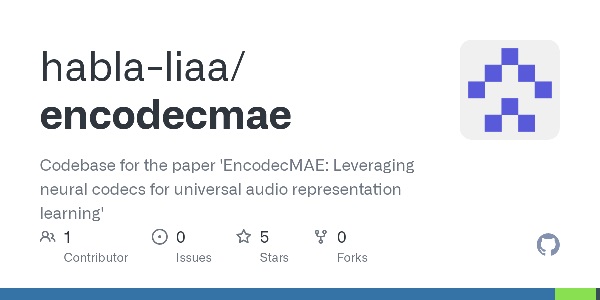Audio processing tasks such as speech recognition, music identification, and environmental sound detection have traditionally required specialized models tailored to each specific task. However, researchers have recently made significant strides in developing a universal audio model that can effectively handle various audio tasks. This groundbreaking method, known as EncodecMAE, draws inspiration from text-based models and demonstrates promising results across different types of audio processing.
EncodecMAE builds upon the concept of Multilingual Autoencoders (MAEs), which have been successful in text-based natural language processing tasks. MAEs employ encoder-decoder architectures to learn compact representations of input data and then reconstruct it. Researchers have adapted this idea to the audio domain by introducing EncodecMAE, an audio version of the MAE framework.
The EncodecMAE approach addresses the challenge of creating a single model that can comprehensively handle speech, music, and sound recognition tasks. By leveraging the power of deep learning techniques, EncodecMAE learns to extract meaningful audio features and generate accurate reconstructions. This flexibility allows the model to adapt to different audio domains and perform well across a range of audio processing tasks.
The key advantage of EncodecMAE is its ability to capture both global and local audio patterns, enabling it to understand complex audio signals. Through the encoding-decoding process, the model learns to extract high-level representations that are useful for tasks like speech recognition or identifying specific sounds. Furthermore, EncodecMAE can leverage its learned knowledge to generalize across audio domains, making it highly adaptable and efficient.
The development of a universal audio model like EncodecMAE has significant implications for various industries and applications. In the realm of speech recognition, for instance, a single model that can understand and transcribe different languages or dialects would be highly valuable. Music identification services, too, could benefit from a versatile model capable of recognizing diverse genres, artists, and songs. Additionally, in applications like surveillance or acoustic monitoring, a universal audio model could effectively detect and categorize a wide range of environmental sounds.
EncodecMAE’s adoption of ideas from text-based models brings several advantages to the table. The transferability of techniques from one domain to another showcases the power of interdisciplinary research. By borrowing concepts and architectures from successful natural language processing models, researchers have paved the way for innovative approaches in audio processing.
It is important to note that while EncodecMAE shows great promise, further research and fine-tuning are needed to refine its performance across different audio tasks. As with any emerging technology, ongoing developments and improvements will be integral to unlocking the full potential of this universal audio model.
The development of EncodecMAE represents a significant milestone in audio processing research. By borrowing ideas from text-based models and adapting them to the audio domain, researchers have created a universal audio model capable of understanding speech, identifying music, and recognizing sounds in the environment. This breakthrough has wide-ranging implications for industries that heavily rely on audio processing and opens up new possibilities for more efficient and adaptable audio models.
Sources:
- ArXiv – EncodecMAE: A Universal Audio Model for Speech, Music, and Environmental Sound Processing
- Medium – How EncodecMAE Makes One Model Work for Audio Tasks
- LinkedIn – Research Update: EncodecMAE – A Universal Audio Model
Get ready to dive into a world of AI news, reviews, and tips at Wicked Sciences! If you’ve been searching the internet for the latest insights on artificial intelligence, look no further. We understand that staying up to date with the ever-evolving field of AI can be a challenge, but Wicked Science is here to make it easier. Our website is packed with captivating articles and informative content that will keep you informed about the latest trends, breakthroughs, and applications in the world of AI. Whether you’re a seasoned AI enthusiast or just starting your journey, Wicked Science is your go-to destination for all things AI. Discover more by visiting our website today and unlock a world of fascinating AI knowledge.





